your dermal diagnosis™ results
Good day,
We're thrilled you're taking proactive steps to understand your skin better.
Below, you'll find your most recent Dermal Diagnosis™ results. Use this data as a roadmap to achieving healthier skin.
| Date | Dermal Diagnosis™ | Profile and Treatment Plan |
|---|---|---|
DERMAL DIAGNOSIS™ RESULT BREAKDOWN
| Aging Score | Hydration Score | Pigmentation Score | Inflammation category |
|---|---|---|---|
| Date | Dermal Diagnosis™ |
|---|---|
DERMAL DIAGNOSIS™ RESULT BREAKDOWN
| Aging Score | |
| Hydration Score | |
| Pigmentation Score | |
| Inflammation category |

's Dermal Diagnosis™ Profile:
Dry . Allergy . Pre-Teen / Teenager Skin
your frustrations
- Persistent Dryness: Constant dryness can cause uncomfortable tightness and visible flakiness, making it difficult to maintain smooth and comfortable skin.
- Allergic Reactions: Increased sensitivity to environmental factors and skincare products can lead to redness, itching, and rashes, making it challenging to find products that are both effective and gentle.
- Sensitive Skin: Dry, allergy-prone skin is often highly sensitive, reacting poorly to changes in weather, skincare products, or allergens, resulting in frequent irritation and discomfort.
- Inadequate Hydration: Even with regular use of moisturizers, achieving and maintaining optimal hydration can be a struggle, leading to ongoing issues with dryness and discomfort.
your goals
- Enhanced Hydration: Achieve and maintain optimal moisture levels to alleviate dryness, improve skin comfort, and prevent flakiness.
- Minimized Allergic Reactions: Reduce the frequency and severity of allergic reactions by using gentle, hypoallergenic products specifically designed for sensitive skin.
- Soothing and Calming: Provide relief from irritation, redness, and itching, ensuring your skin feels more comfortable and balanced.
- Improved Skin Barrier: Strengthen the skin’s natural barrier to better protect against environmental aggressors and prevent moisture loss, promoting long-term skin health.

Even Skin Tone

early intervention

no acne or rosacea
-
No Pigmentation: Your skin likely maintains an even tone without the common issues of dark spots or uneven pigmentation. This indicates a balanced distribution of melanin, which, while beneficial for an even complexion, may suggest a need for extra protection against UV radiation due to lower melanin levels.
-
Heightened Awareness of Ingredients: Being allergy-prone makes you more vigilant about the ingredients in your skincare products. This heightened awareness can lead to more informed choices, reducing the risk of adverse reactions and promoting skin health.
-
Lower Risk of Acne: Due to the dry nature of your skin, there is typically a lower risk of acne breakouts than oilier skin types, as less sebum production can lead to clogged pores.

Allergy Prone

Rough Skin Texture

Dehydrated Skin
-
Allergy prone: Being prone to allergies means your skin may react more sensitively to various external factors, including certain skincare ingredients, environmental allergens, or dietary triggers. This can lead to redness, itching, and irritation, making it crucial to identify and avoid known allergens in your skincare and lifestyle.
-
Compromised Skin Barrier: The skin's natural barrier is weakened and susceptible to environmental damage.
-
Dehydration: AD Skin Type struggles with maintaining adequate hydration. This is exacerbated by an impaired skin barrier that cannot effectively retain moisture, leading to trans-epidermal water loss (TEWL). Insufficient moisture makes The skin feel dry, tight, and uncomfortable.
Dry . Allergy . Pre-Teen / Teenager Skin
Treatment objectives

Elimination of Triggers
Rigorously identify and avoid triggers, such as irritants and allergens, which can significantly worsen the condition.

Allergy Management
Implement a skincare regimen that minimizes the risk of allergic reactions with hypoallergenic, fragrance-free, and non-irritating formulations.

Improve Skin Texture
Promote smooth and healthier skin, which can lead to enhanced comfort and confidence.

Restore Skin Barrier
Repair the damaged skin barrier through replenishment of essential skin lipids, ceramides, and fatty acids, preventing transepidermal water loss and protecting against irritants.

Deeply Hydrate and Nourish
Advance the skin's hydration capabilities by boosting its capacity to attract and retain moisture at a cellular level. Promote the enhancement of the skin's own hydrating agents, ensuring sustained moisture balance and preventing dryness.

Sun Damage Protection
Protect against harmful UV rays, preventing sun damage and encouraging the habit of daily sunscreen application.
Dry . Allergy . Pre-Teen / Teenager Skin
Beneficial Active Ingredients
Zinc Pyrithione
Zinc pyrithione, a compound with potent antifungal and antibacterial properties, has established itself as a cornerstone in the treatment of various skin conditions, particularly those involving Malassezia yeast. Its effectiveness against seborrheic dermatitis and dandruff, which are often associated with an overgrowth of Malassezia species, makes it a key ingredient for many dermatological conditions.
Zinc pyrithione’s mode of action is multifaceted, primarily targeting the membrane of fungi and bacteria, thereby disrupting their growth and replication. One of its significant mechanisms involves inhibiting fungal cell membrane transport by blocking the energy production pathway, which is crucial for cell survival.
In Malassezia, yeast, a natural inhabitant of the skin flora, can overgrow and cause conditions like seborrheic dermatitis and dandruff; zinc pyrithione's antifungal action is particularly beneficial. It reduces the yeast population on the skin, thereby alleviating the symptoms associated with its overgrowth, such as flaking, irritation, and redness.
Its efficacy in treating seborrheic dermatitis is attributed to its ability to reduce the Malassezia count, diminish inflammatory responses, and soothe the skin. Similarly, in dandruff, which is often linked to an excess of Malassezia, zinc pyrithione effectively reduces flaking and itchiness, promoting a healthier scalp environment.
The efficacy of zinc pyrithione in the treatment of seborrheic dermatitis and dandruff is well-documented. Its safety profile and efficacy have been confirmed by numerous studies, with significant improvements observed in both scalp and skin conditions following regular use.
Physiological Effects
- Antifungal Activity: It is effective against a range of fungi, including those that cause dandruff and seborrheic dermatitis. Zinc Pyrithione inhibits the division of fungal cells, reducing their proliferation.
- Antibacterial Properties: This compound also exhibits antibacterial activity, making it useful in treating and preventing bacterial skin infections.
- Anti-inflammatory Effects: Zinc Pyrithione can reduce inflammation, which is beneficial in alleviating symptoms of various inflammatory skin conditions.
- Sebum Regulation: It helps in regulating sebum production, which can be beneficial for oily skin and conditions like acne.
Managing Dermatological Conditions
- Dandruff and Seborrheic Dermatitis: Zinc Pyrithione is a common ingredient in anti-dandruff shampoos and is effective in controlling the flaking and itching associated with these conditions.
- Psoriasis: It can help manage the symptoms of psoriasis, particularly in reducing scaling and redness.
- Acne: Due to its antibacterial and anti-inflammatory properties, Zinc Pyrithione can be beneficial in the treatment of acne.
- Fungal Infections: It is effective in treating various fungal skin infections due to its antifungal properties.
References
- Warshaw, E. M., et al. (2005). Efficacy of Zinc Pyrithione in Seborrheic Dermatitis and Dandruff. Dermatology.
- Pierard-Franchimont, C., et al. (2002). Antidandruff shampoo efficacy in dandruff/seborrhoeic dermatitis. International Journal of Cosmetic Science.
- Scheman, A., et al. (2000). Antimicrobial Activity of Zinc Pyrithione. American Journal of Infection Control.
Ceramides
Ceramides, a family of lipid molecules naturally present in the skin, are integral to the structure and function of the skin barrier. They are a type of lipid that, along with cholesterol and fatty acids, forms a critical part of the stratum corneum, the outermost layer of the skin. This layer is essential for maintaining skin hydration and protecting against environmental aggressors.
Ceramides, which make up about 50% of the skin's lipid composition, play a pivotal role in maintaining the skin's barrier integrity and preventing transepidermal water loss (TEWL). By doing so, they help keep the skin hydrated and supple.
The loss or reduction of ceramides in the skin barrier is associated with several dermatological conditions, including eczema and psoriasis, where the skin becomes dry, itchy, and prone to irritation and infection. Studies have shown that the application of ceramide-containing moisturizers can effectively improve skin barrier function and increase skin hydration levels.
Ceramides are particularly beneficial for aging skin, which naturally loses ceramides over time, leading to drier and more fragile skin. By replenishing the skin's ceramide content, these products can help combat the signs of aging, such as fine lines and wrinkles.
Ceramides are integral to maintaining skin health, particularly in conditions where the skin barrier is compromised. Their role in hydrating the skin, reducing sensitivity, and improving barrier function makes them an essential component in the management of various dermatological conditions, especially eczema, psoriasis, and dry or aging skin.
Physiological Effects
- Barrier Function: Ceramides are critical components of the skin's lipid barrier. They help to prevent moisture loss and protect against environmental aggressors like pollutants and irritants.
- Hydration: By maintaining the barrier integrity, ceramides keep the skin hydrated, preventing dryness and keeping the skin supple.
- Reducing Skin Sensitivity: They play a role in reducing skin sensitivity and irritation, helping to calm inflamed and reactive skin.
- Anti-aging Properties: Ceramides can improve skin elasticity and firmness, helping to reduce the appearance of fine lines and wrinkles.
- Wound Healing: There is evidence to suggest that ceramides can aid in the skin's natural wound healing process.
Managing Dermatological Conditions
- Eczema and Atopic Dermatitis: Ceramides are often used in the treatment of eczema and atopic dermatitis, where the skin barrier is compromised, leading to dryness, itching, and inflammation.
- Psoriasis: They can help in managing psoriasis by maintaining skin hydration and barrier function, reducing scaling and dryness.
- Aging Skin: Ceramide-containing products are beneficial in anti-aging regimens due to their ability to improve skin barrier function and elasticity.
- Dry Skin (Xerosis): In the treatment of dry skin, ceramides help in restoring skin hydration and barrier function.
- Sensitive Skin: Products containing ceramides are suitable for sensitive skin as they help to restore the skin's natural barrier and reduce irritation.
References
- Del Rosso, J. Q., & Levin, J. (2011). The clinical relevance of maintaining the functional integrity of the stratum corneum in both healthy and disease-affected skin. Journal of Clinical and Aesthetic Dermatology.
- Farwanah, H., Wohlrab, J., Neubert, R. H. H., & Raith, K. (2005). Ceramides and skin function. American Journal of Clinical Dermatology.
- Di Nardo, A., Wertz, P., Giannetti, A., & Seidenari, S. (1998). Ceramide and cholesterol composition of the skin of patients with atopic dermatitis. Acta Dermato-Venereologica.
Niacinamide
Niacinamide offers several benefits for the skin, primarily due to its anti-inflammatory and antioxidant properties. It reduces the redness and inflammation associated with acne, rosacea, and other inflammatory skin conditions. Additionally, niacinamide's ability to improve the skin's barrier function benefits all skin types, particularly those with eczema or mature skin.
Another significant benefit of niacinamide is its role in reducing hyperpigmentation. Studies have shown that it can decrease the transfer of melanin to the epidermis, helping to fade dark spots and even out skin tone.
Niacinamide also plays a role in reducing the visible signs of aging. It has been found to stimulate collagen production and improve skin elasticity, reducing fine lines and wrinkles. Its antioxidant properties further protect the skin from environmental damage, such as pollution and UV radiation, which contribute to premature aging.
The efficacy of niacinamide and its ability to address multiple skin concerns simultaneously has led to its growing popularity in both over-the-counter and prescription skincare formulations.
Physiological Effects
- Barrier Function Enhancement: Niacinamide helps strengthen the skin’s barrier function by increasing the production of ceramides, lipids that keep the skin hydrated and protect against environmental damage.
- Anti-inflammatory Properties: It has notable anti-inflammatory effects, which are beneficial in reducing redness and inflammation associated with acne, eczema, and other inflammatory skin conditions.
- Sebum Regulation: Niacinamide helps regulate sebum production, which controls excess oiliness and can benefit acne-prone skin.
- Hyperpigmentation Reduction: It reduces hyperpigmentation by inhibiting melanosome transfer from melanocytes to keratinocytes, leading to an even skin tone.
- Anti-aging Effects: Niacinamide helps reduce the appearance of fine lines and wrinkles by boosting collagen production and improving skin elasticity.
- Antioxidant Activity: It has antioxidant properties, protecting the skin from oxidative stress and environmental aggressors like UV radiation and pollution.
Managing Dermatological Conditions
- Acne and Oily Skin: Niacinamide effectively manages acne and oily skin by regulating sebum and reducing inflammation.
- Hyperpigmentation and Melasma: Its ability to reduce melanin transfer benefits it in treating hyperpigmentation and melasma.
- Aging Skin: Niacinamide targets wrinkles and loss of firmness.
- Skin Barrier Disorders: Niacinamide is beneficial in treating skin barrier disorders like atopic dermatitis and eczema by enhancing barrier function and hydration.
- Photodamage and Skin Protection: It helps mitigate the effects of photodamage and provides some degree of protection against environmental damage.
References
- Gehring, W. (2004). Nicotinic acid/niacinamide and the skin. Journal of Cosmetic Dermatology.
- Bissett, D. L., Oblong, J. E., & Berge, C. A. (2005). Niacinamide: A B vitamin that improves aging facial skin appearance. Dermatologic Surgery.
- Snaidr, V. A., Damian, D. L., & Halliday, G. M. (2019). Nicotinamide for photoprotection and skin cancer chemoprevention: A review of efficacy and safety. Experimental Dermatology.
- Navarrete-Solís, J. et al. (2011). A Double-Blind, Randomized Clinical Trial of Niacinamide 4% versus Hydroquinone 4% in the Treatment of Melasma. Dermatology Research and Practice, 2011.
Hyaluronic acid
Hyaluronic acid (HA) is a naturally occurring glycosaminoglycan found throughout the body's connective, epithelial, and neural tissues. Most abundantly present in the skin, eyes, and synovial fluid, HA is renowned for its exceptional capacity to retain moisture — a single gram can hold up to six liters of water.
In skincare, the primary appeal of hyaluronic acid lies in its unparalleled hydrating abilities. As a humectant, HA attracts and retains moisture from the environment, providing intense hydration to the skin. This hydrating property contributes significantly to maintaining skin plumpness, suppleness, and elasticity.
Beyond hydration, hyaluronic acid also plays a vital role in skin repair and regeneration. It supports the skin's healing and repair processes, and its anti-inflammatory properties help calm irritated skin. Moreover, HA's ability to promote collagen production, a crucial protein for skin elasticity, further underscores its anti-aging benefits.
The molecular size of hyaluronic acid influences its skin penetration and efficacy. High-molecular-weight HA remains on the skin's surface, providing hydration and forming a barrier against moisture loss. In contrast, low-molecular-weight HA penetrates deeper into the skin's layers, offering more profound hydrating and rejuvenating effects.
Hyaluronic acid's remarkable ability to hydrate, improve skin elasticity, aid in wound healing, and provide antioxidant protection makes it valuable in managing various dermatological conditions, particularly aging, dryness, and sensitive skin.
Physiological Effects
- Hydration: Hyaluronic acid is a powerful humectant that can hold up to 1000 times its weight in water, significantly enhancing skin hydration and leading to plumper, more hydrated skin.
- Skin Elasticity and Wrinkle Reduction: By increasing skin moisture, it improves skin elasticity, reduces the appearance of fine lines and wrinkles, and gives the skin a more youthful appearance.
- Wound Healing: It plays a role in wound healing due to its ability to regulate inflammation levels and signal the body to build more blood vessels in the damaged area.
- Barrier Enhancement: Hyaluronic acid helps reinforce the skin's natural barriers, protecting against environmental factors and retaining moisture.
- Antioxidant Properties: It provides antioxidant defense against free-radical damage from the sun and pollution.
Managing Dermatological Conditions
- Aging Skin: Its ability to reduce wrinkles and improve skin elasticity makes it popular in anti-aging skincare products.
- Dry Skin: Hyaluronic acid is beneficial in treating dry skin conditions by providing intense hydration.
- Wound Care: Its role in wound healing is leveraged in post-procedure care, such as after laser treatments, and in healing minor cuts and abrasions.
- Acne Scars: It can help treat acne scars by promoting skin regeneration and reducing inflammation.
- Sensitive Skin: Hyaluronic acid is suitable for sensitive skin due to its gentle nature. It provides hydration without irritating.
References
- Papakonstantinou, E., Roth, M., & Karakiulakis, G. (2012). Hyaluronic acid: A key molecule in skin aging. Dermato-endocrinology.
- Jegasothy, S. M., Zabolotniaia, V., & Bielfeldt, S. (2014). Efficacy of a new topical nano-hyaluronic acid in humans. The Journal of Clinical and Aesthetic Dermatology.
- Wollina, U., & Abdel-Naser, M. B. (2019). Hyaluronic acid in the treatment and prevention of skin diseases: Molecular biological, pharmaceutical and clinical aspects. Skin Pharmacology and Physiology.
Humectants
Humectants are a vital component in skincare, particularly for conditions characterized by impaired skin barrier function and excessive dryness. Their ability to attract and retain moisture in the skin makes them invaluable in both therapeutic and preventive dermatology.
Physiological Effects
- Moisture Attraction: Humectants draw moisture from the environment and the deeper layers of the skin to the outer layer (stratum corneum), enhancing skin hydration.
- Enhancing Skin Barrier Function: By improving skin hydration, humectants help to maintain and improve the skin's barrier function, protecting against irritants and reducing transepidermal water loss (TEWL).
- Skin Elasticity and Appearance: Improved hydration can enhance skin elasticity and reduce the appearance of fine lines and wrinkles, giving the skin a plumper and smoother look.
- Soothing Effect: Humectants can have a soothing effect on the skin, particularly in conditions involving dryness or irritation.
Managing Dermatological Conditions
- Dry Skin (Xerosis): Humectants are key ingredients in many moisturizers and are highly effective in managing dry skin by providing and maintaining hydration.
- Eczema and Dermatitis: Their moisturizing and soothing properties help in relieving symptoms of eczema and dermatitis, such as dryness, itching, and irritation.
- Aging Skin: Humectants are used in anti-aging skincare products due to their ability to hydrate the skin and improve its appearance.
- Psoriasis: They can aid in reducing the dryness and scaling associated with psoriasis.
- Acne-Prone Skin: Certain humectants can be beneficial in acne treatments, as they provide necessary hydration without clogging pores.
References
- Lodén, M. (2005). Role of Topical Emollients and Moisturizers in the Treatment of Dry Skin Barrier Disorders. American Journal of Clinical Dermatology.
- Rawlings, A. V., & Canestrari, D. A. (2011). Moisturizer technology versus clinical performance. Dermatologic Therapy.
- Fluhr, J. W., Darlenski, R., & Surber, C. (2008). Glycerol and the skin: holistic approach to its origin and functions. British Journal of Dermatology.
Vitamin E
The fat-soluble Vitamin E's benefits in maintaining skin health and appearance are well-acknowledged in both cosmetic and clinical dermatology. Comprising a group of eight compounds, including four tocopherols and four tocotrienols, Vitamin E is known for its role in protecting cell membranes from oxidative damage.
Vitamin E is celebrated in skincare for its ability to neutralize free radicals caused by environmental stressors such as UV radiation and pollution. These free radicals can lead to premature skin aging, making Vitamin E a valuable ingredient in anti-aging skincare products. Its antioxidant action helps to protect the skin from damage, reduce the appearance of wrinkles, and improve skin texture and tone.
Additionally, Vitamin E is known for its moisturizing benefits. It helps to strengthen the skin barrier, reduce moisture loss, and keep the skin hydrated and supple. This makes it especially beneficial for dry and damaged skin.
Vitamin E also has anti-inflammatory properties, making it beneficial in soothing and calming irritated skin. This has implications for conditions such as dermatitis and acne, where inflammation plays a key role.
Physiological Effects
- Antioxidant Protection: Vitamin E neutralizes harmful free radicals in the skin, preventing oxidative stress and damage caused by environmental factors like UV radiation and pollution.
- Moisturization: It has moisturizing properties, helping to improve skin hydration and alleviate dryness.
- Wound Healing: Vitamin E may assist in the skin's healing process, although its efficacy in wound healing is still a subject of research.
- Photoprotection: While not a sunscreen, it can provide some degree of photoprotection by strengthening the skin's defense against UV-induced damage.
- Anti-Inflammatory Effects: It helps reduce skin inflammation and is beneficial in managing conditions like eczema and psoriasis.
Managing Dermatological Conditions
- Skin Aging: Its antioxidant properties make it useful in anti-aging skincare products to protect against free radical damage and improve skin appearance.
- Dry Skin Conditions: Vitamin E's moisturizing effects are beneficial in treating dry skin and improving overall skin texture.
- Inflammatory Skin Diseases: It can be helpful in soothing inflammatory skin conditions like eczema and psoriasis.
- Sun Protection and Repair: Vitamin E is included in sunscreens and after-sun products for its ability to mitigate sun damage.
- Scar Treatment: Some studies suggest Vitamin E may help reduce the appearance of scars, although evidence is mixed.
References
- Thiele, J. J., Hsieh, S. N., & Ekanayake-Mudiyanselage, S. (1998). Vitamin E: Critical Review of Its Current Use in Cosmetic and Clinical Dermatology. Dermatologic Surgery, 24(7), 805–813.
- Ratz-Łyko, A., & Arct, J. (2016). Anti-inflammatory and anti-aging properties of active skin care ingredients. Journal of Clinical and Aesthetic Dermatology, 9(9), 36–40.
- Keen, M. A., & Hassan, I. (2016). Vitamin E in dermatology. Indian Dermatology Online Journal.
- Ekanayake-Mudiyanselage, S., & Thiele, J. (2007). Vitamin E in human skin: Organ-specific physiology and considerations for its use in dermatology. Molecular Aspects of Medicine.
- Nachbar, F., & Korting, H. C. (1995). The role of vitamin E in normal and damaged skin. Journal of Molecular Medicine.
Essential Fatty Acids
Essential Fatty Acids: Nourishing Your Skin from Within
In the realm of dermatological science, essential fatty acids (EFAs) have emerged as unsung heroes, offering a multifaceted approach to improving skin health in patients with conditions such as eczema and dry skin.
Pharmacological Advantages
EFAs are not only instrumental in maintaining the skin's structural integrity but also possess anti-inflammatory properties. They serve as precursors for pro-resolving lipid mediators like resolvins and protectins, which help reduce skin inflammation, itching, and redness—common symptoms of eczema.
Physiological Harmony
EFAs contribute to maintaining the balance of skin hydration. They enhance the skin's ability to retain water, leaving it supple and hydrated. Moreover, EFAs can modulate the skin's immune response, reducing the severity of allergic reactions and flare-ups often seen in dermatological conditions like eczema.
Biochemical Brilliance
Essential fatty acids, including omega-3 and omega-6, are the building blocks of the skin's lipid barrier. This barrier acts as a protective shield, preventing excessive moisture loss and shielding the skin from external aggressors. EFAs play a pivotal role in maintaining this barrier's integrity by contributing to the synthesis of ceramides and lipids that bind skin cells together.
References
- Elias, P. M. et al. (2008). Skin diseases associated with decreased epidermal lipogenesis. Annals of the New York Academy of Sciences, 1141(1), 1-13.
- Ziboh, V. A. et al. (2000). Biochemical basis of the essential fatty acid requirement for normative growth in neonatal baboons. American Journal of Clinical Nutrition, 71(1), 3-11.
- Serhan, C. N. (2014). Pro-resolving lipid mediators are leads for resolution physiology. Nature, 510(7503), 92-101.
- Levesque, A. et al. (2018). Omega-3 fatty acids: Anti-inflammatory and skin barrier benefits. Omega-3 Fatty Acids: Keys to Nutritional Health, 303-315.
- Nicolaou, A. (2013). Eicosanoids in skin inflammation. Prostaglandins, Leukotrienes, and Essential Fatty Acids, 88(1), 131-138.
- Meydani, S. N. et al. (2018). Nutrition interventions in aging and age-associated diseases. Annals of the New York Academy of Sciences, 1418(1), 34-51.
Coenzyme Q10
CoQ10 is a potent ingredient that offers comprehensive skin health and appearance benefits. Its role in energy production and its antioxidant and anti-aging properties make it invaluable for photoprotection, anti-aging, and overall skin vitality. Its incorporation into DermExcel sunscreen represents a holistic approach to skin health, addressing protective and restorative needs.
Physiological Impact
- Skin Barrier Enhancement: CoQ10 contributes to the strength and health of the skin barrier, improving its ability to retain moisture and protect against external irritants and pollutants.
- Skin Repair and Regeneration: It supports the skin's natural ability to repair itself and regenerate, maintaining a healthy, youthful appearance. This is particularly beneficial in mature skin, where natural levels of CoQ10 may be depleted.
Pharmacological Advantages
- Anti-Aging Effects: CoQ10's antioxidant properties contribute to its anti-aging effects. By reducing oxidative stress, it helps to minimize the visible signs of aging, such as wrinkles and fine lines.
- Photoprotection: It enhances the skin's defense against photoaging caused by exposure to UV rays. CoQ10 helps to mitigate the degradation of collagen and elastin, proteins essential for maintaining skin elasticity and firmness.
Biochemical Benefits
- Cellular Energy Production: CoQ10 plays a crucial role in the mitochondrial electron transport chain, which is essential for the production of ATP, the primary energy currency of the cell. This function is vital for maintaining the health and vitality of skin cells.
- Antioxidant Properties: It acts as a lipophilic antioxidant, neutralizing free radicals and preventing oxidative damage to cell membranes, proteins, and DNA. This is particularly important in the skin, which is frequently exposed to oxidative stress from environmental factors like UV radiation.
MORNING
EVENING
MORNING
EVENING
Morning Regimen Notes
For the best use of Medi-Zinc Cleanser, please check the detailed instructions on its product page. You can access this page by clicking the cleanser's name above.
Apply Dermdefence SPF 50 after cleansing.
Evening Regimen Notes
For the best use of Medi-Zinc Cleanser, please check the detailed instructions on its product page. You can access this page by clicking the cleanser's name above.
Apply Enriched every evening after cleansing.
Your skin, identified as dry and allergy-prone, requires special attention, especially during your tween and teenage years. During this time of ongoing development and hormonal changes, your skin may be more vulnerable to dryness and heightened sensitivity. The combination of these factors can make it harder for your skin to retain moisture, increasing its susceptibility to irritation and environmental triggers.
Focusing on strengthening your skin’s natural barrier is key. This means incorporating products that deliver deep hydration and protect against allergens and irritants. While your skin may face challenges, it has the potential to become more resilient with the right care. By adopting a skincare routine that emphasizes moisture retention, barrier support, and soothing ingredients, you can help your skin stay healthy and comfortable.
Taking the time to care for your skin now will not only address its current needs but also lay the foundation for long-term skin health. With consistent and thoughtful care, your skin can thrive, reflecting the attention and dedication you’ve given to its well-being.
Dry . Allergy . Pre-Teen / Teenager Skin
your treatment pack
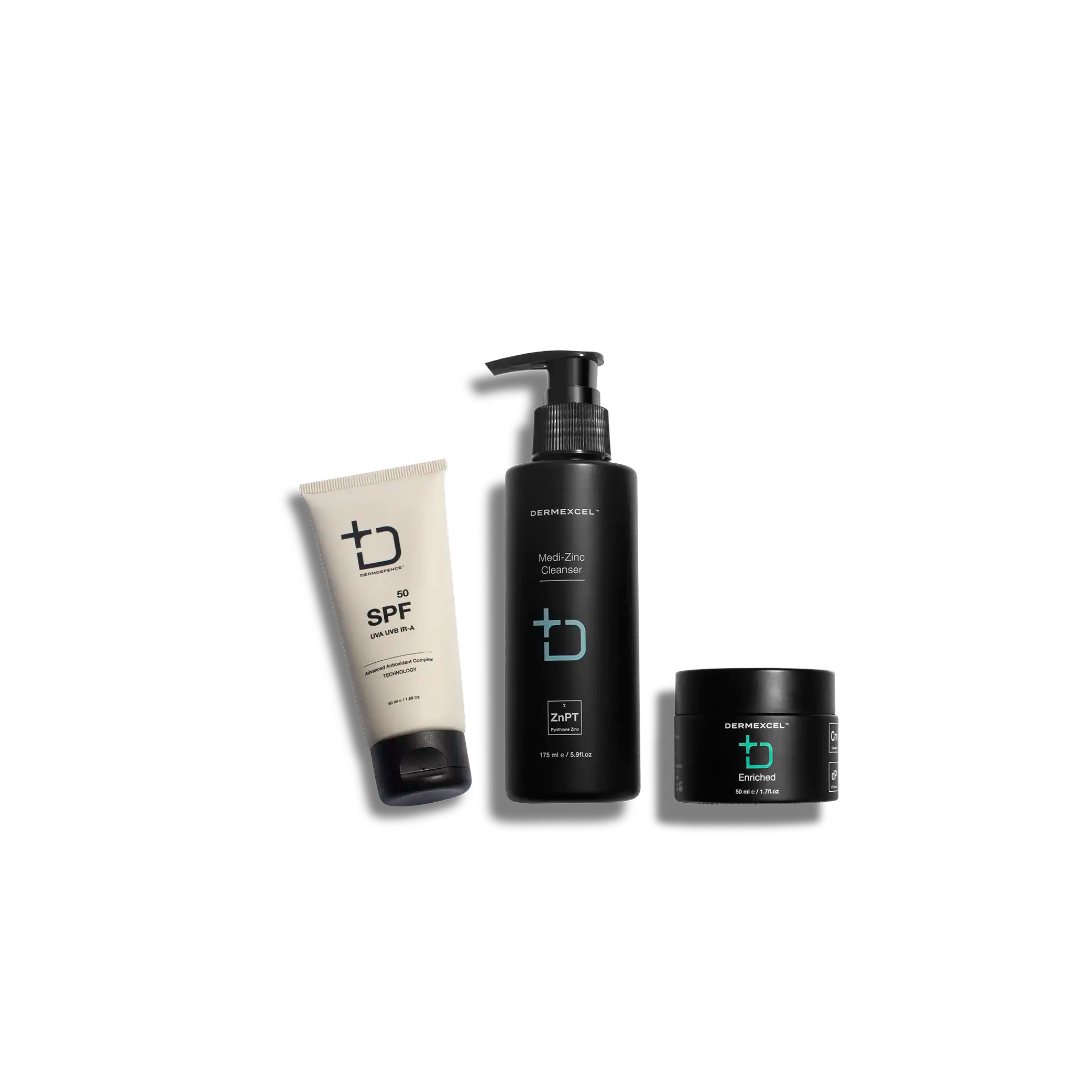
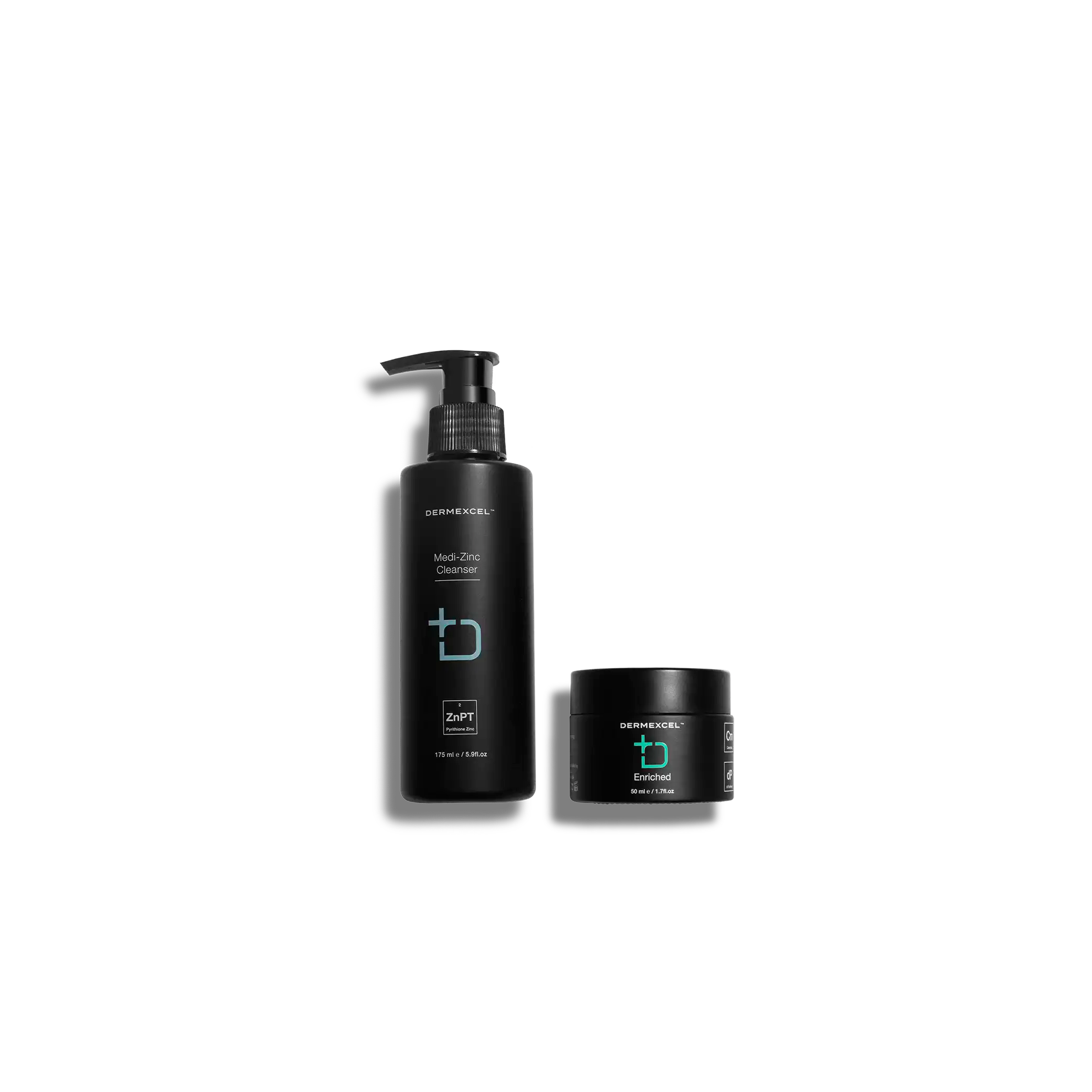




Treatment pack for pre-teens and teenagers with dry skin prone to allergic reactions.

≈ microbiome

Smooth Skin

hydrated skin

DNA repair

barrier repair
Products included




Free Gifts with your treatment pack

Cotton Bag

Microfibre Sponge

Choose options


Treatment pack for pre-teens and teenagers with dry skin prone to allergic reactions.
Dry . Allergy . Pre-Teen / Teenager Skin
products in your treatment pack
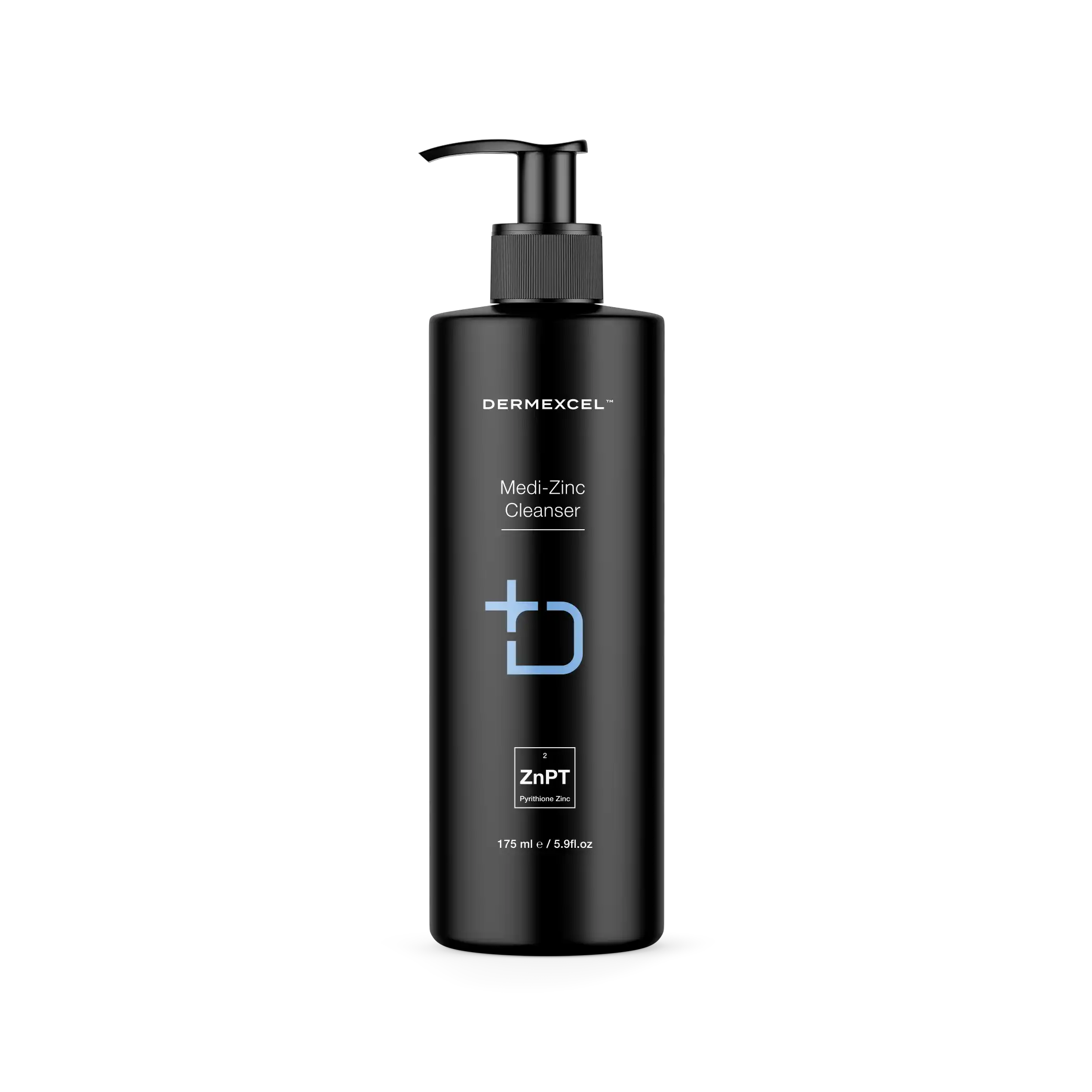
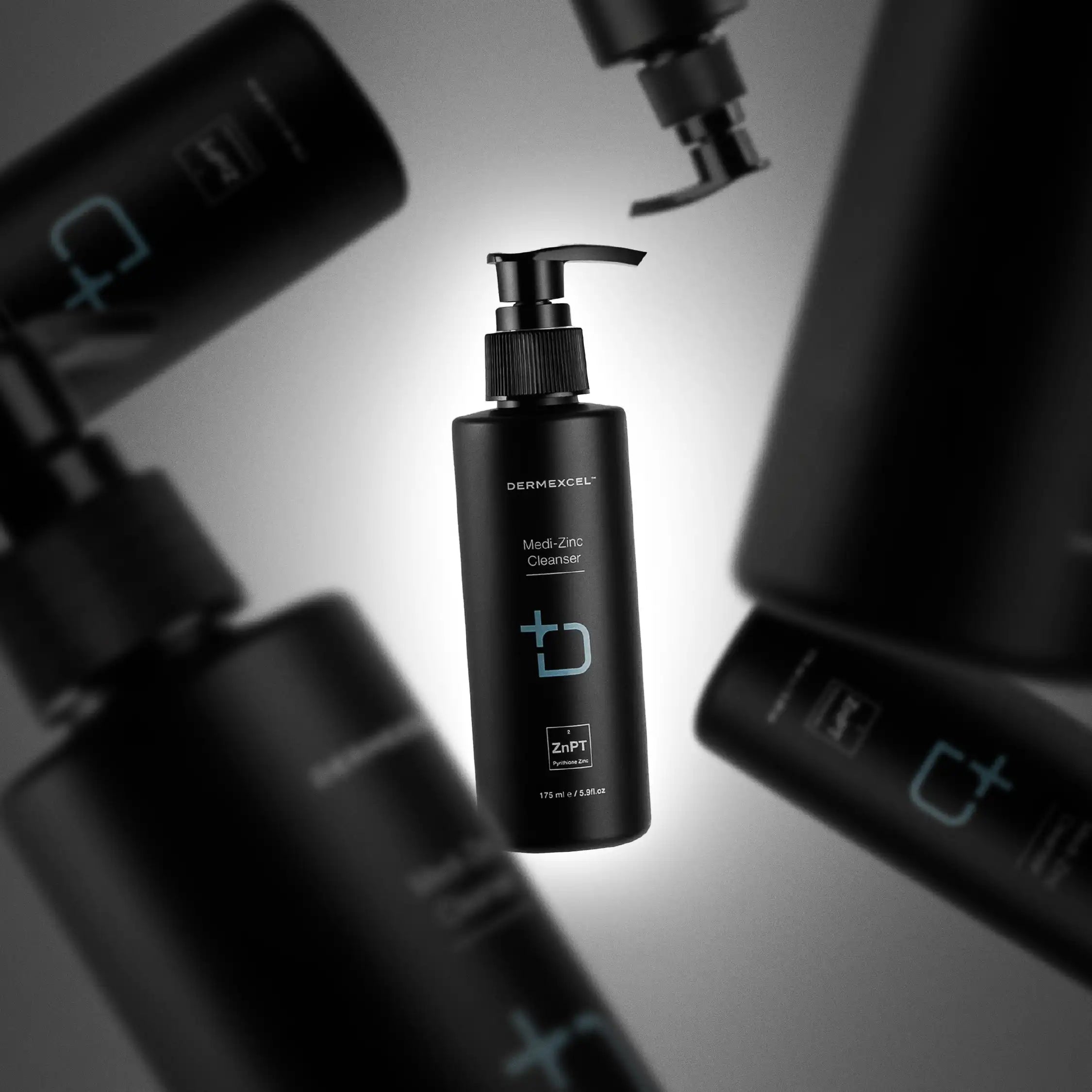
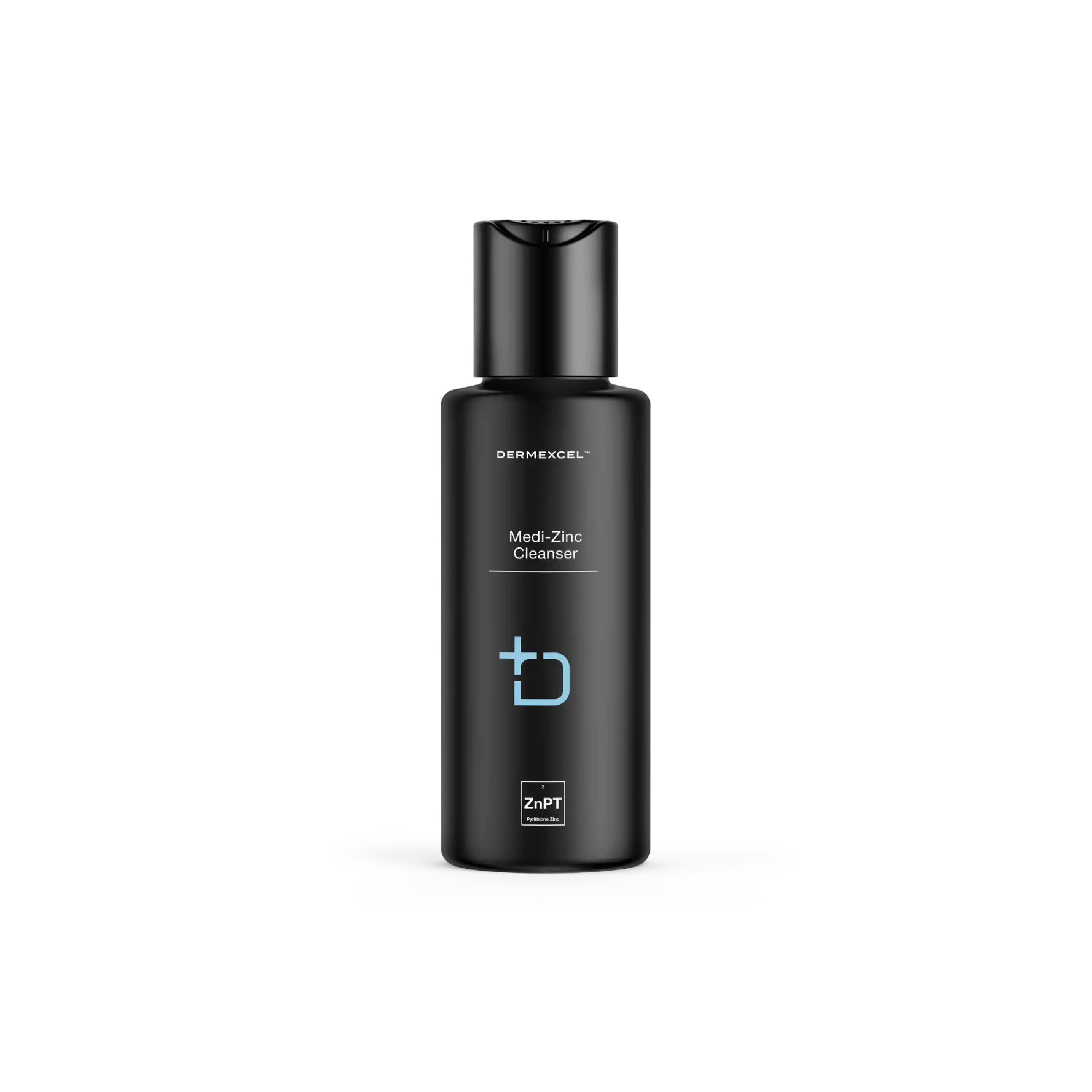





Itch Relief

Anti-Acne

↓ inflammation

anti-redness

Anti-microbial
Zinc Pyrithione
Zinc pyrithione, a compound with potent antifungal and antibacterial properties, has established itself as a cornerstone in the treatment of various skin conditions, particularly those involving Malassezia yeast. Its effectiveness against seborrheic dermatitis and dandruff, which are often associated with an overgrowth of Malassezia species, makes it a key ingredient for many dermatological conditions.
Zinc pyrithione’s mode of action is multifaceted, primarily targeting the membrane of fungi and bacteria, thereby disrupting their growth and replication. One of its significant mechanisms involves inhibiting fungal cell membrane transport by blocking the energy production pathway, which is crucial for cell survival.
In Malassezia, yeast, a natural inhabitant of the skin flora, can overgrow and cause conditions like seborrheic dermatitis and dandruff; zinc pyrithione's antifungal action is particularly beneficial. It reduces the yeast population on the skin, thereby alleviating the symptoms associated with its overgrowth, such as flaking, irritation, and redness.
Its efficacy in treating seborrheic dermatitis is attributed to its ability to reduce the Malassezia count, diminish inflammatory responses, and soothe the skin. Similarly, in dandruff, which is often linked to an excess of Malassezia, zinc pyrithione effectively reduces flaking and itchiness, promoting a healthier scalp environment.
The efficacy of zinc pyrithione in the treatment of seborrheic dermatitis and dandruff is well-documented. Its safety profile and efficacy have been confirmed by numerous studies, with significant improvements observed in both scalp and skin conditions following regular use.
Physiological Effects
- Antifungal Activity: It is effective against a range of fungi, including those that cause dandruff and seborrheic dermatitis. Zinc Pyrithione inhibits the division of fungal cells, reducing their proliferation.
- Antibacterial Properties: This compound also exhibits antibacterial activity, making it useful in treating and preventing bacterial skin infections.
- Anti-inflammatory Effects: Zinc Pyrithione can reduce inflammation, which is beneficial in alleviating symptoms of various inflammatory skin conditions.
- Sebum Regulation: It helps in regulating sebum production, which can be beneficial for oily skin and conditions like acne.
Managing Dermatological Conditions
- Dandruff and Seborrheic Dermatitis: Zinc Pyrithione is a common ingredient in anti-dandruff shampoos and is effective in controlling the flaking and itching associated with these conditions.
- Psoriasis: It can help manage the symptoms of psoriasis, particularly in reducing scaling and redness.
- Acne: Due to its antibacterial and anti-inflammatory properties, Zinc Pyrithione can be beneficial in the treatment of acne.
- Fungal Infections: It is effective in treating various fungal skin infections due to its antifungal properties.
References
- Warshaw, E. M., et al. (2005). Efficacy of Zinc Pyrithione in Seborrheic Dermatitis and Dandruff. Dermatology.
- Pierard-Franchimont, C., et al. (2002). Antidandruff shampoo efficacy in dandruff/seborrhoeic dermatitis. International Journal of Cosmetic Science.
- Scheman, A., et al. (2000). Antimicrobial Activity of Zinc Pyrithione. American Journal of Infection Control.
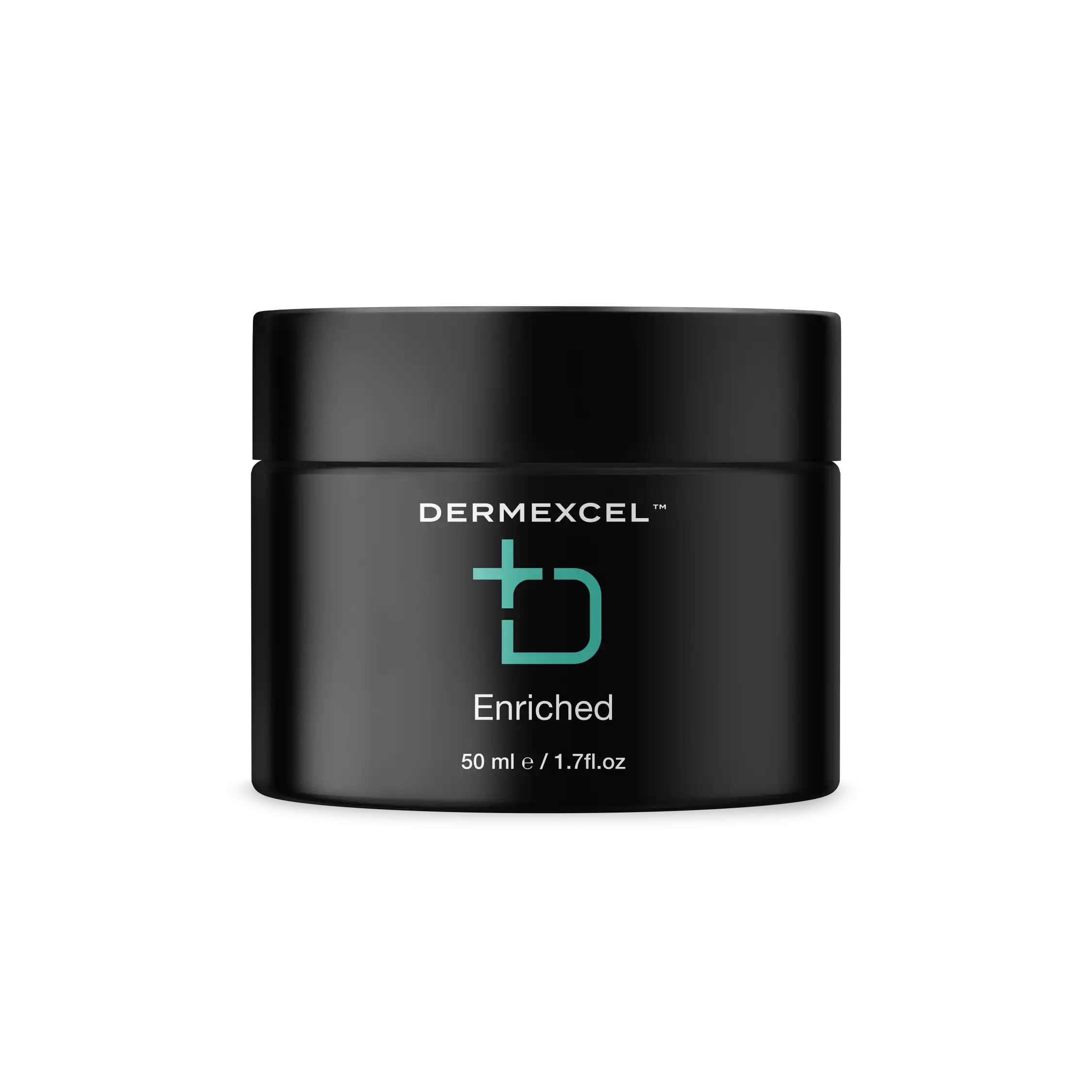
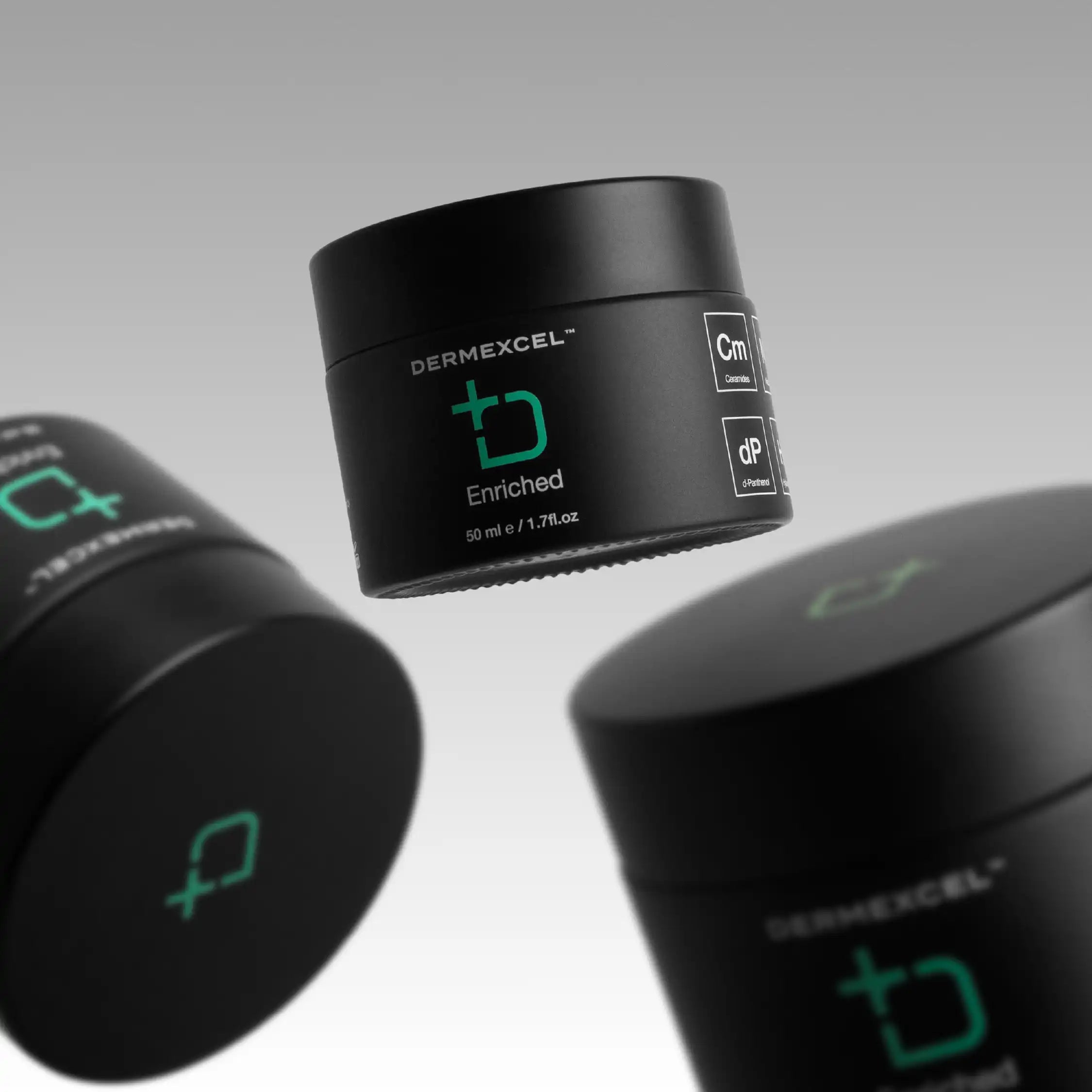
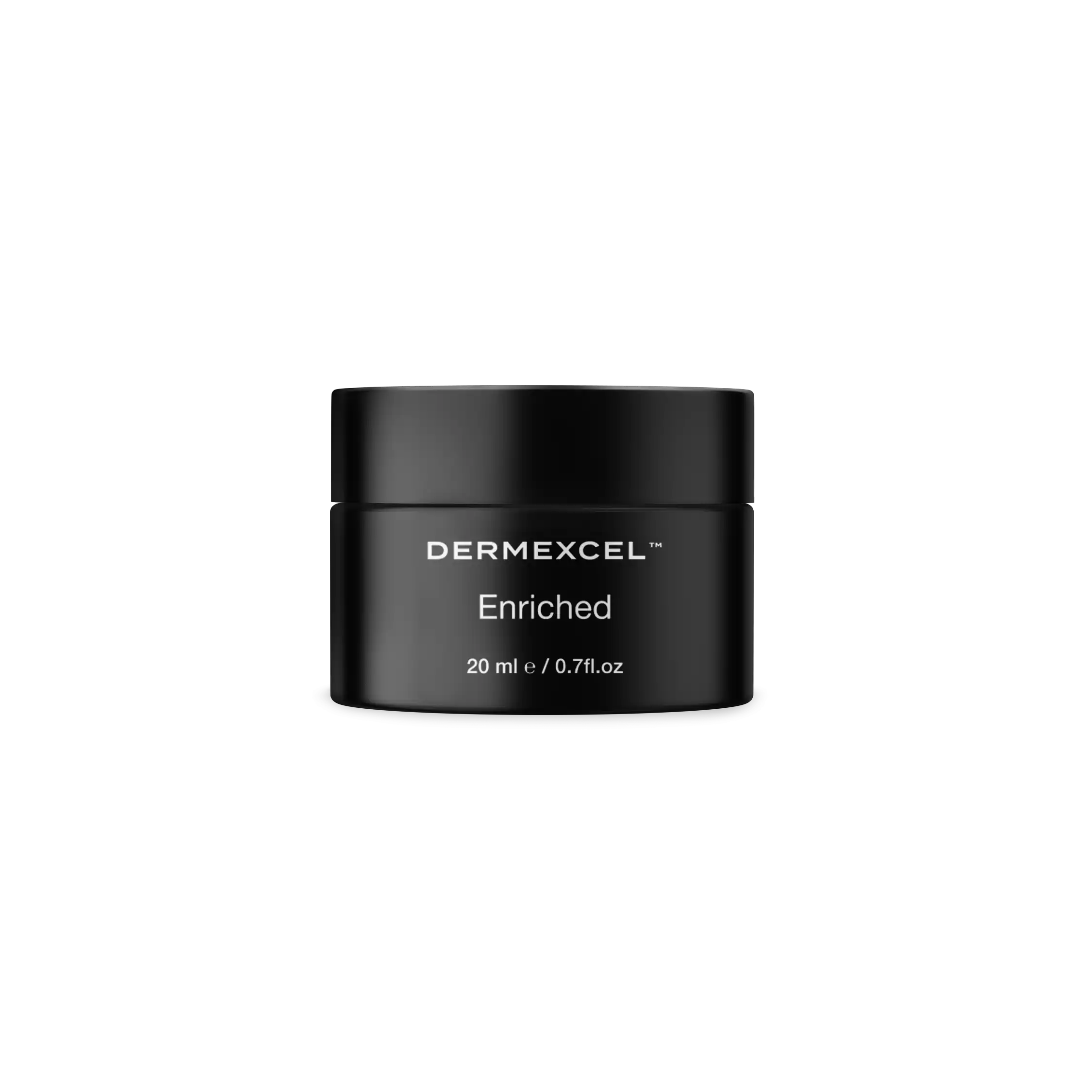





irritated skin

aging

Dry skin

Inflammation

Allergies
Ceramides
Ceramides, a family of lipid molecules naturally present in the skin, are integral to the structure and function of the skin barrier. They are a type of lipid that, along with cholesterol and fatty acids, forms a critical part of the stratum corneum, the outermost layer of the skin. This layer is essential for maintaining skin hydration and protecting against environmental aggressors.
Ceramides, which make up about 50% of the skin's lipid composition, play a pivotal role in maintaining the skin's barrier integrity and preventing transepidermal water loss (TEWL). By doing so, they help keep the skin hydrated and supple.
The loss or reduction of ceramides in the skin barrier is associated with several dermatological conditions, including eczema and psoriasis, where the skin becomes dry, itchy, and prone to irritation and infection. Studies have shown that the application of ceramide-containing moisturizers can effectively improve skin barrier function and increase skin hydration levels.
Ceramides are particularly beneficial for aging skin, which naturally loses ceramides over time, leading to drier and more fragile skin. By replenishing the skin's ceramide content, these products can help combat the signs of aging, such as fine lines and wrinkles.
Ceramides are integral to maintaining skin health, particularly in conditions where the skin barrier is compromised. Their role in hydrating the skin, reducing sensitivity, and improving barrier function makes them an essential component in the management of various dermatological conditions, especially eczema, psoriasis, and dry or aging skin.
Physiological Effects
- Barrier Function: Ceramides are critical components of the skin's lipid barrier. They help to prevent moisture loss and protect against environmental aggressors like pollutants and irritants.
- Hydration: By maintaining the barrier integrity, ceramides keep the skin hydrated, preventing dryness and keeping the skin supple.
- Reducing Skin Sensitivity: They play a role in reducing skin sensitivity and irritation, helping to calm inflamed and reactive skin.
- Anti-aging Properties: Ceramides can improve skin elasticity and firmness, helping to reduce the appearance of fine lines and wrinkles.
- Wound Healing: There is evidence to suggest that ceramides can aid in the skin's natural wound healing process.
Managing Dermatological Conditions
- Eczema and Atopic Dermatitis: Ceramides are often used in the treatment of eczema and atopic dermatitis, where the skin barrier is compromised, leading to dryness, itching, and inflammation.
- Psoriasis: They can help in managing psoriasis by maintaining skin hydration and barrier function, reducing scaling and dryness.
- Aging Skin: Ceramide-containing products are beneficial in anti-aging regimens due to their ability to improve skin barrier function and elasticity.
- Dry Skin (Xerosis): In the treatment of dry skin, ceramides help in restoring skin hydration and barrier function.
- Sensitive Skin: Products containing ceramides are suitable for sensitive skin as they help to restore the skin's natural barrier and reduce irritation.
References
- Del Rosso, J. Q., & Levin, J. (2011). The clinical relevance of maintaining the functional integrity of the stratum corneum in both healthy and disease-affected skin. Journal of Clinical and Aesthetic Dermatology.
- Farwanah, H., Wohlrab, J., Neubert, R. H. H., & Raith, K. (2005). Ceramides and skin function. American Journal of Clinical Dermatology.
- Di Nardo, A., Wertz, P., Giannetti, A., & Seidenari, S. (1998). Ceramide and cholesterol composition of the skin of patients with atopic dermatitis. Acta Dermato-Venereologica.
Niacinamide
Niacinamide offers several benefits for the skin, primarily due to its anti-inflammatory and antioxidant properties. It reduces the redness and inflammation associated with acne, rosacea, and other inflammatory skin conditions. Additionally, niacinamide's ability to improve the skin's barrier function benefits all skin types, particularly those with eczema or mature skin.
Another significant benefit of niacinamide is its role in reducing hyperpigmentation. Studies have shown that it can decrease the transfer of melanin to the epidermis, helping to fade dark spots and even out skin tone.
Niacinamide also plays a role in reducing the visible signs of aging. It has been found to stimulate collagen production and improve skin elasticity, reducing fine lines and wrinkles. Its antioxidant properties further protect the skin from environmental damage, such as pollution and UV radiation, which contribute to premature aging.
The efficacy of niacinamide and its ability to address multiple skin concerns simultaneously has led to its growing popularity in both over-the-counter and prescription skincare formulations.
Physiological Effects
- Barrier Function Enhancement: Niacinamide helps strengthen the skin’s barrier function by increasing the production of ceramides, lipids that keep the skin hydrated and protect against environmental damage.
- Anti-inflammatory Properties: It has notable anti-inflammatory effects, which are beneficial in reducing redness and inflammation associated with acne, eczema, and other inflammatory skin conditions.
- Sebum Regulation: Niacinamide helps regulate sebum production, which controls excess oiliness and can benefit acne-prone skin.
- Hyperpigmentation Reduction: It reduces hyperpigmentation by inhibiting melanosome transfer from melanocytes to keratinocytes, leading to an even skin tone.
- Anti-aging Effects: Niacinamide helps reduce the appearance of fine lines and wrinkles by boosting collagen production and improving skin elasticity.
- Antioxidant Activity: It has antioxidant properties, protecting the skin from oxidative stress and environmental aggressors like UV radiation and pollution.
Managing Dermatological Conditions
- Acne and Oily Skin: Niacinamide effectively manages acne and oily skin by regulating sebum and reducing inflammation.
- Hyperpigmentation and Melasma: Its ability to reduce melanin transfer benefits it in treating hyperpigmentation and melasma.
- Aging Skin: Niacinamide targets wrinkles and loss of firmness.
- Skin Barrier Disorders: Niacinamide is beneficial in treating skin barrier disorders like atopic dermatitis and eczema by enhancing barrier function and hydration.
- Photodamage and Skin Protection: It helps mitigate the effects of photodamage and provides some degree of protection against environmental damage.
References
- Gehring, W. (2004). Nicotinic acid/niacinamide and the skin. Journal of Cosmetic Dermatology.
- Bissett, D. L., Oblong, J. E., & Berge, C. A. (2005). Niacinamide: A B vitamin that improves aging facial skin appearance. Dermatologic Surgery.
- Snaidr, V. A., Damian, D. L., & Halliday, G. M. (2019). Nicotinamide for photoprotection and skin cancer chemoprevention: A review of efficacy and safety. Experimental Dermatology.
- Navarrete-Solís, J. et al. (2011). A Double-Blind, Randomized Clinical Trial of Niacinamide 4% versus Hydroquinone 4% in the Treatment of Melasma. Dermatology Research and Practice, 2011.
d-Panthenol
d-Panthenol's multifaceted effects on skin hydration, barrier strengthening, and wound healing make it a valuable component in the management of various dermatological conditions, from dry skin to post-procedure care.
d-Panthenol, also known as pro-vitamin B5, is a popular dermatological ingredient due to its beneficial effects on the skin. Here's a brief overview of its physiological effects and roles in managing various skin conditions:
Physiological Effects
- Hydration: d-Panthenol is a humectant, meaning it helps to attract and retain moisture in the skin. This leads to increased skin hydration, which can improve skin softness and elasticity.
- Wound Healing and Repair: It plays a role in the synthesis of lipids and proteins, essential for skin repair. d-Panthenol has been shown to accelerate re-epithelialization in wound healing.
- Anti-Inflammatory Effect: d-Panthenol can reduce inflammation, making it beneficial in treating skin irritations and erythema.
- Skin Barrier Strengthening: By enhancing the synthesis of lipids and proteins, d-Panthenol contributes to the strengthening of the skin's barrier function, protecting against irritants and environmental damage.
- Soothing and Softening: It soothes the skin and makes it feel softer and smoother, which can be particularly beneficial for dry or rough skin textures.
Managing Dermatological Conditions
- Minor Wounds and Skin Irritations: Due to its role in skin repair and anti-inflammatory properties, d-Panthenol is used in the treatment of minor wounds, cuts, and skin irritations.
- Dermatitis and Eczema: It helps in managing conditions like dermatitis and eczema by reducing inflammation and enhancing skin barrier function.
- Dry Skin Conditions (Xerosis): Its moisturizing properties make it effective in treating dry skin, providing relief from itching and scaling.
- Post-procedure Care: d-Panthenol is often used in post-procedure care, such as after laser treatments or chemical peels, to aid in skin recovery and reduce inflammation.
References
- Proksch, E., & Nissen, H. P. (2002). Dexpanthenol enhances skin barrier repair and reduces inflammation after sodium lauryl sulphate-induced irritation. Journal of Dermatological Treatment.
- Ebner, F., Heller, A., Rippke, F., & Tausch, I. (2002). Topical use of dexpanthenol in skin disorders. American Journal of Clinical Dermatology.
- Camargo, F. B. Jr, Gaspar, L. R., & Maia Campos, P. M. B. G. (2011). Skin moisturizing effects of panthenol-based formulations. Journal of Cosmetic Science.
Essential Fatty Acids
Essential Fatty Acids: Nourishing Your Skin from Within
In the realm of dermatological science, essential fatty acids (EFAs) have emerged as unsung heroes, offering a multifaceted approach to improving skin health in patients with conditions such as eczema and dry skin.
Pharmacological Advantages
EFAs are not only instrumental in maintaining the skin's structural integrity but also possess anti-inflammatory properties. They serve as precursors for pro-resolving lipid mediators like resolvins and protectins, which help reduce skin inflammation, itching, and redness—common symptoms of eczema.
Physiological Harmony
EFAs contribute to maintaining the balance of skin hydration. They enhance the skin's ability to retain water, leaving it supple and hydrated. Moreover, EFAs can modulate the skin's immune response, reducing the severity of allergic reactions and flare-ups often seen in dermatological conditions like eczema.
Biochemical Brilliance
Essential fatty acids, including omega-3 and omega-6, are the building blocks of the skin's lipid barrier. This barrier acts as a protective shield, preventing excessive moisture loss and shielding the skin from external aggressors. EFAs play a pivotal role in maintaining this barrier's integrity by contributing to the synthesis of ceramides and lipids that bind skin cells together.
References
- Elias, P. M. et al. (2008). Skin diseases associated with decreased epidermal lipogenesis. Annals of the New York Academy of Sciences, 1141(1), 1-13.
- Ziboh, V. A. et al. (2000). Biochemical basis of the essential fatty acid requirement for normative growth in neonatal baboons. American Journal of Clinical Nutrition, 71(1), 3-11.
- Serhan, C. N. (2014). Pro-resolving lipid mediators are leads for resolution physiology. Nature, 510(7503), 92-101.
- Levesque, A. et al. (2018). Omega-3 fatty acids: Anti-inflammatory and skin barrier benefits. Omega-3 Fatty Acids: Keys to Nutritional Health, 303-315.
- Nicolaou, A. (2013). Eicosanoids in skin inflammation. Prostaglandins, Leukotrienes, and Essential Fatty Acids, 88(1), 131-138.
- Meydani, S. N. et al. (2018). Nutrition interventions in aging and age-associated diseases. Annals of the New York Academy of Sciences, 1418(1), 34-51.
Hyaluronic acid
Hyaluronic acid (HA) is a naturally occurring glycosaminoglycan found throughout the body's connective, epithelial, and neural tissues. Most abundantly present in the skin, eyes, and synovial fluid, HA is renowned for its exceptional capacity to retain moisture — a single gram can hold up to six liters of water.
In skincare, the primary appeal of hyaluronic acid lies in its unparalleled hydrating abilities. As a humectant, HA attracts and retains moisture from the environment, providing intense hydration to the skin. This hydrating property contributes significantly to maintaining skin plumpness, suppleness, and elasticity.
Beyond hydration, hyaluronic acid also plays a vital role in skin repair and regeneration. It supports the skin's healing and repair processes, and its anti-inflammatory properties help calm irritated skin. Moreover, HA's ability to promote collagen production, a crucial protein for skin elasticity, further underscores its anti-aging benefits.
The molecular size of hyaluronic acid influences its skin penetration and efficacy. High-molecular-weight HA remains on the skin's surface, providing hydration and forming a barrier against moisture loss. In contrast, low-molecular-weight HA penetrates deeper into the skin's layers, offering more profound hydrating and rejuvenating effects.
Hyaluronic acid's remarkable ability to hydrate, improve skin elasticity, aid in wound healing, and provide antioxidant protection makes it valuable in managing various dermatological conditions, particularly aging, dryness, and sensitive skin.
Physiological Effects
- Hydration: Hyaluronic acid is a powerful humectant that can hold up to 1000 times its weight in water, significantly enhancing skin hydration and leading to plumper, more hydrated skin.
- Skin Elasticity and Wrinkle Reduction: By increasing skin moisture, it improves skin elasticity, reduces the appearance of fine lines and wrinkles, and gives the skin a more youthful appearance.
- Wound Healing: It plays a role in wound healing due to its ability to regulate inflammation levels and signal the body to build more blood vessels in the damaged area.
- Barrier Enhancement: Hyaluronic acid helps reinforce the skin's natural barriers, protecting against environmental factors and retaining moisture.
- Antioxidant Properties: It provides antioxidant defense against free-radical damage from the sun and pollution.
Managing Dermatological Conditions
- Aging Skin: Its ability to reduce wrinkles and improve skin elasticity makes it popular in anti-aging skincare products.
- Dry Skin: Hyaluronic acid is beneficial in treating dry skin conditions by providing intense hydration.
- Wound Care: Its role in wound healing is leveraged in post-procedure care, such as after laser treatments, and in healing minor cuts and abrasions.
- Acne Scars: It can help treat acne scars by promoting skin regeneration and reducing inflammation.
- Sensitive Skin: Hyaluronic acid is suitable for sensitive skin due to its gentle nature. It provides hydration without irritating.
References
- Papakonstantinou, E., Roth, M., & Karakiulakis, G. (2012). Hyaluronic acid: A key molecule in skin aging. Dermato-endocrinology.
- Jegasothy, S. M., Zabolotniaia, V., & Bielfeldt, S. (2014). Efficacy of a new topical nano-hyaluronic acid in humans. The Journal of Clinical and Aesthetic Dermatology.
- Wollina, U., & Abdel-Naser, M. B. (2019). Hyaluronic acid in the treatment and prevention of skin diseases: Molecular biological, pharmaceutical and clinical aspects. Skin Pharmacology and Physiology.
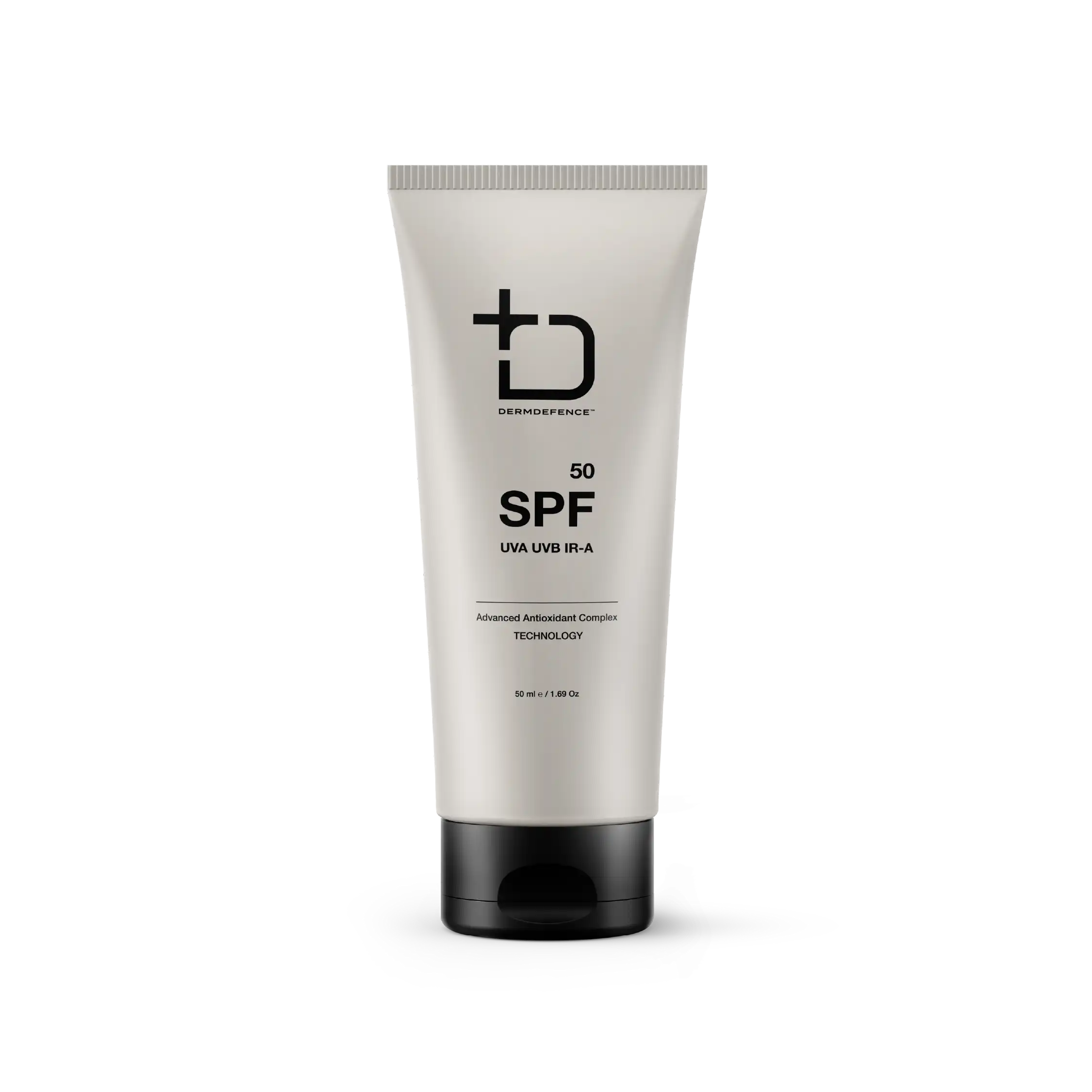
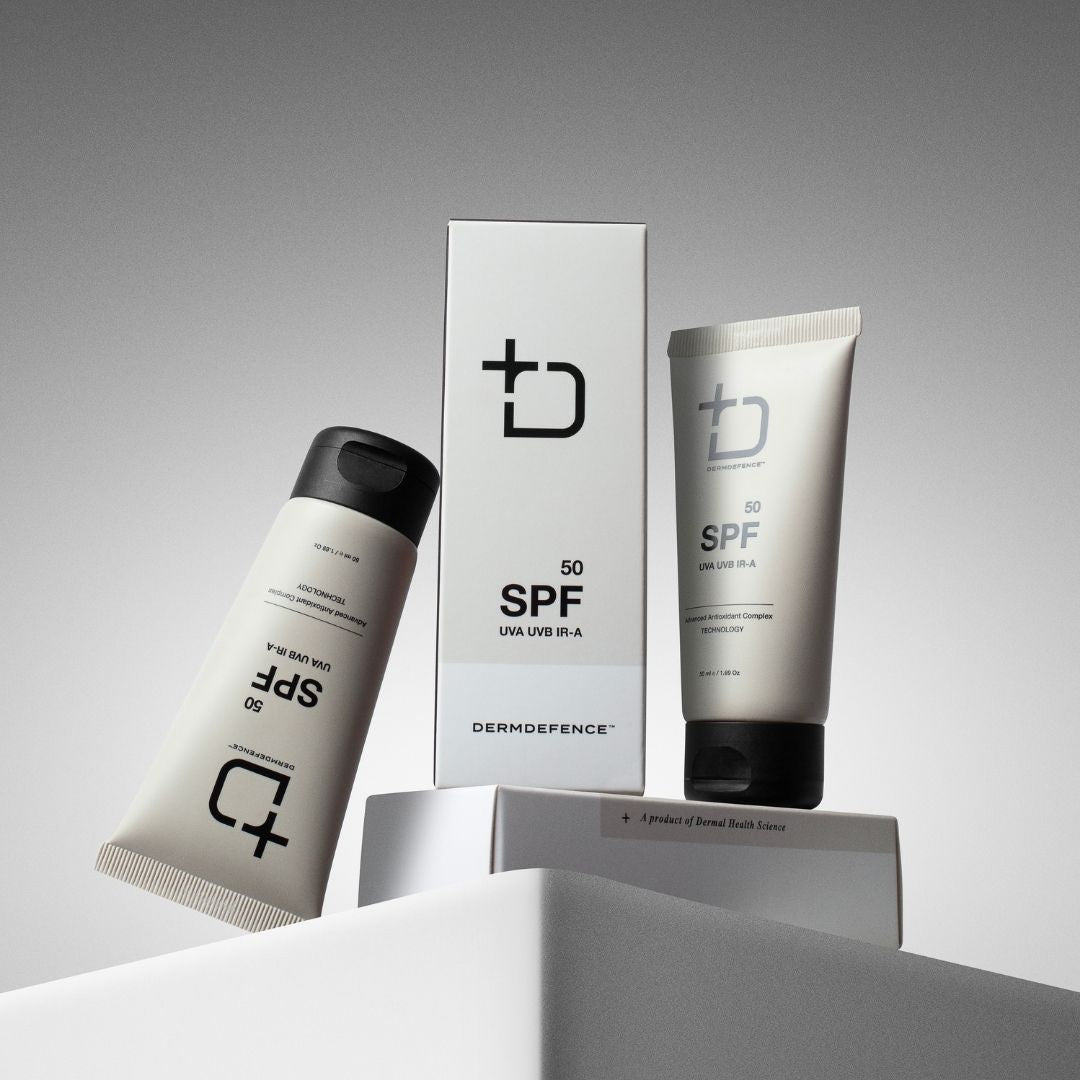




SIZE: 50 mL

Antioxidant

anti-aging

DNA repair

sun protection

Moisturizing
Coenzyme Q10
CoQ10 is a potent ingredient that offers comprehensive skin health and appearance benefits. Its role in energy production and its antioxidant and anti-aging properties make it invaluable for photoprotection, anti-aging, and overall skin vitality. Its incorporation into DermExcel sunscreen represents a holistic approach to skin health, addressing protective and restorative needs.
Physiological Impact
- Skin Barrier Enhancement: CoQ10 contributes to the strength and health of the skin barrier, improving its ability to retain moisture and protect against external irritants and pollutants.
- Skin Repair and Regeneration: It supports the skin's natural ability to repair itself and regenerate, maintaining a healthy, youthful appearance. This is particularly beneficial in mature skin, where natural levels of CoQ10 may be depleted.
Pharmacological Advantages
- Anti-Aging Effects: CoQ10's antioxidant properties contribute to its anti-aging effects. By reducing oxidative stress, it helps to minimize the visible signs of aging, such as wrinkles and fine lines.
- Photoprotection: It enhances the skin's defense against photoaging caused by exposure to UV rays. CoQ10 helps to mitigate the degradation of collagen and elastin, proteins essential for maintaining skin elasticity and firmness.
Biochemical Benefits
- Cellular Energy Production: CoQ10 plays a crucial role in the mitochondrial electron transport chain, which is essential for the production of ATP, the primary energy currency of the cell. This function is vital for maintaining the health and vitality of skin cells.
- Antioxidant Properties: It acts as a lipophilic antioxidant, neutralizing free radicals and preventing oxidative damage to cell membranes, proteins, and DNA. This is particularly important in the skin, which is frequently exposed to oxidative stress from environmental factors like UV radiation.
Vitamin E
The fat-soluble Vitamin E's benefits in maintaining skin health and appearance are well-acknowledged in both cosmetic and clinical dermatology. Comprising a group of eight compounds, including four tocopherols and four tocotrienols, Vitamin E is known for its role in protecting cell membranes from oxidative damage.
Vitamin E is celebrated in skincare for its ability to neutralize free radicals caused by environmental stressors such as UV radiation and pollution. These free radicals can lead to premature skin aging, making Vitamin E a valuable ingredient in anti-aging skincare products. Its antioxidant action helps to protect the skin from damage, reduce the appearance of wrinkles, and improve skin texture and tone.
Additionally, Vitamin E is known for its moisturizing benefits. It helps to strengthen the skin barrier, reduce moisture loss, and keep the skin hydrated and supple. This makes it especially beneficial for dry and damaged skin.
Vitamin E also has anti-inflammatory properties, making it beneficial in soothing and calming irritated skin. This has implications for conditions such as dermatitis and acne, where inflammation plays a key role.
Physiological Effects
- Antioxidant Protection: Vitamin E neutralizes harmful free radicals in the skin, preventing oxidative stress and damage caused by environmental factors like UV radiation and pollution.
- Moisturization: It has moisturizing properties, helping to improve skin hydration and alleviate dryness.
- Wound Healing: Vitamin E may assist in the skin's healing process, although its efficacy in wound healing is still a subject of research.
- Photoprotection: While not a sunscreen, it can provide some degree of photoprotection by strengthening the skin's defense against UV-induced damage.
- Anti-Inflammatory Effects: It helps reduce skin inflammation and is beneficial in managing conditions like eczema and psoriasis.
Managing Dermatological Conditions
- Skin Aging: Its antioxidant properties make it useful in anti-aging skincare products to protect against free radical damage and improve skin appearance.
- Dry Skin Conditions: Vitamin E's moisturizing effects are beneficial in treating dry skin and improving overall skin texture.
- Inflammatory Skin Diseases: It can be helpful in soothing inflammatory skin conditions like eczema and psoriasis.
- Sun Protection and Repair: Vitamin E is included in sunscreens and after-sun products for its ability to mitigate sun damage.
- Scar Treatment: Some studies suggest Vitamin E may help reduce the appearance of scars, although evidence is mixed.
References
- Thiele, J. J., Hsieh, S. N., & Ekanayake-Mudiyanselage, S. (1998). Vitamin E: Critical Review of Its Current Use in Cosmetic and Clinical Dermatology. Dermatologic Surgery, 24(7), 805–813.
- Ratz-Łyko, A., & Arct, J. (2016). Anti-inflammatory and anti-aging properties of active skin care ingredients. Journal of Clinical and Aesthetic Dermatology, 9(9), 36–40.
- Keen, M. A., & Hassan, I. (2016). Vitamin E in dermatology. Indian Dermatology Online Journal.
- Ekanayake-Mudiyanselage, S., & Thiele, J. (2007). Vitamin E in human skin: Organ-specific physiology and considerations for its use in dermatology. Molecular Aspects of Medicine.
- Nachbar, F., & Korting, H. C. (1995). The role of vitamin E in normal and damaged skin. Journal of Molecular Medicine.
Broad Spectrum Filters
Tinosorb® M and Tinosorb® S represent sophisticated advancements in sun protection technology.
Tinosorb® M
- Biochemical Action: A unique UV filter due to its ability to function through absorption, reflection, and scattering of UV rays.
- Physiological Impact: The triple-action mechanism of Tinosorb® M offers comprehensive sun protection. By mitigating the penetration of both UVA and UVB rays, it significantly reduces the risk of DNA damage, photoaging, and carcinogenesis. Its ability to remain on the skin's surface reduces systemic exposure, making it a safer option with minimal potential for irritation or allergic reactions.
Tinosorb® S
- Biochemical Action: A broad-spectrum UV filter with a molecular structure that effectively absorbs both UVA and UVB rays. Additionally, it enhances the photostability of other UV filters, making the sunscreen formulation more effective over time.
- Physiological Impact: By providing extensive UVA and UVB protection, Tinosorb® S plays a crucial role in preventing short-term sun damage like sunburn and long-term risks such as skin aging and skin cancer. Its photostability ensures sustained protection during sun exposure, and its compatibility with other UV filters means it can be used to formulate sunscreens that are both effective and suitable for sensitive skin.
Sunscreen
Using sunscreen is a fundamental aspect of skin care and preventive dermatology. It's essential for reducing the risk of skin cancers and photoaging and maintaining overall skin health in the face of constant exposure to UV radiation.
Sunscreen is a vital skincare product designed to protect the skin from the harmful effects of ultraviolet (UV) radiation from the sun. Two primary types of UV radiation affect the skin: UVA and UVB. UVA rays penetrate deep into the skin and are primarily responsible for aging and long-term skin damage, whereas UVB rays cause sunburn and play a key role in developing skin cancer.
Sunscreen products work by either absorbing, reflecting, or scattering sunlight. They contain chemical compounds that absorb UV radiation and convert it into a small amount of heat or physical compounds (like zinc oxide or titanium dioxide) that act as a physical barrier, reflecting UV light away from the skin.
The effectiveness of sunscreen is measured by its Sun Protection Factor (SPF). SPF indicates how well the sunscreen protects against UVB rays. For example, an SPF of 30 means it would take 30 times longer for your skin to burn than without sunscreen. However, it's important to note that no sunscreen can block 100% UV rays.
Regular use of sunscreen with an SPF of at least 30 can reduce the risk of skin cancer, prevent sunburn, and slow down the skin's aging process.
Managing Dermatological Conditions
- Prevention of Sunburn: Sunscreen protects the skin from UVB rays, which cause sunburn. This reduces the immediate risk of skin damage and discomfort.
- Skin Cancer Prevention: Regular use of sunscreen significantly lowers the risk of developing various types of skin cancer, especially melanoma, squamous cell carcinoma, and basal cell carcinoma.
- Prevention of Photoaging: Sunscreen also shields the skin from UVA rays, which penetrate deeper into the skin and are primarily responsible for photoaging, including wrinkles, leathery skin, and sunspots.
- Protection Against Photosensitivity: Sunscreen helps prevent flare-ups triggered by sun exposure for individuals with photosensitive skin conditions like lupus or rosacea.
- Hyperpigmentation and Melasma: It aids in preventing and managing hyperpigmentation and melasma, conditions exacerbated by sun exposure.
- General Skin Health: Sunscreen helps maintain overall skin health and integrity by protecting the skin from UV damage.
References
- Burnett, M. E., & Wang, S. Q. (2011). Current sunscreen controversies: a critical review. Photodermatology, Photoimmunology & Photomedicine.
- Green, A. C., et al. (2011). Reduced melanoma after regular sunscreen use: randomized trial follow-up. Journal of Clinical Oncology.
- Hughes, M. C. B., et al. (2013). Sunscreen and Prevention of Skin Aging: A Randomized Trial. Annals of Internal Medicine.


















